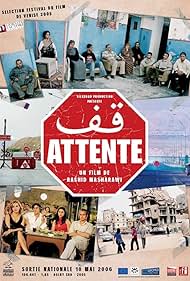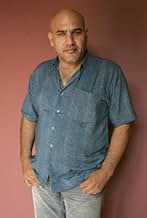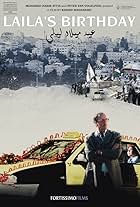'Waiting' (2005) (also known as 'Attente', its French title) is the latest film of acclaimed and accomplished Palestinian director Rashid Mashrawi. It was shown earlier this month at the Barbican as part of the London Palestine Film Festival, an annual cultural occasion that has outgrown its humble beginnings seven years ago as an event organised by the Palestine Society at the School of Oriental and African Studies.
The films manifests the fundamental status of exiled Palestinians - that of a people waiting for justice to be done, waiting for permits and permissions to be granted, waiting for eventual return to their homeland in historical Palestine. It is a bitter indictment of the situation suffered by some four million Palestinian refugees, and documents the common experience that binds them together in a tragicomic farce.
It is no surprise that the film ends with an ambivalent lack of solutions and not a small complication for the three primary characters.
Ahmad, Bissan and Loumir are Palestinian filmmakers from the Gaza Strip who have been given a European Union grant to seek players for a planned Palestinian National Theatre in Gaza City. The whole absurdist proposition of a national theatre, funded by well-meaning but ultimately out-of-touch bureaucrats in Brussels, brings a further note of pathos to the scene.
The three characters set off, tilting at windmills in search of actors within the squalid, overpopulated refugee camps of Jordan, Syria and Lebanon. But at the auditions most of those who have waited hours for a moment in front of the camera use the opportunity to send messages to loved ones still in the occupied territories. It is not the prospect of a life on the stage that draws them to the camera, but the chance to return - if only temporarily - to their homes and long-lost family.
The 'actors' (actually sourced from the refugee camps) refuse to read from the script presented to them, or perform the task with a deep sense of boredom. Their ennui leads the director to stubbornly request that each applicant demonstrate an idea of 'waiting'. The results are often laughable. One older man takes to the task like the proverbial fish to water, assuming a position of vague indifference that seems habitual. Others check constantly if their performance is adequate.
One young man indicates his impression of waiting by first taking off his shoes, then his socks, his shirt, and his trousers, before turning to face the wall, hands raised in submission. It is a powerful image.
As the film progresses it seems increasingly likely that the funds will not come through, and that the theatre project will be indefinitely postponed. The task is continued however, in the vague hope of achieving something. The film endlessly loops over itself, with the protagonists finding themselves at film's end in a similar situation to their subject. Trapped and waiting.
Ironically enough the director Rashid Mashrawi was unable to host a Q&A after the film because he was barred from entering the UK from France, even though he held a visa for the EU.
www.alisharp.net








